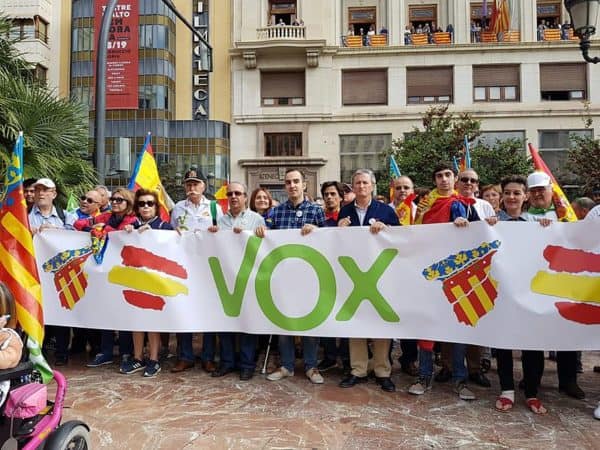Spain’s Weak Governments and a Rising Far Right Mark Not a Return to the Past but a New Political Era
Jeremy Cliffe, The New Statesman, November 13, 2019

Spanish citizens showing their support for Vox in the city of Valencia. (Credit Image: Vox Valencia)
Anyone seeking proof that Spain is its own political world could have found it in the results of its general election on 10 November. The fourth such vote in four years produced yet more uncertainty. Far from securing the stable governing majority they wanted, Prime Minister Pedro Sánchez’s centre-left Socialists (PSOE) slipped backwards and are now cobbling together a coalition. Having done a deal with the radical-left Unidas Podemos they now need the tacit or explicit support of other leftists and regionalists. Vox, a far-right party formed only in 2013, became the third-largest force in the new parliament. Meanwhile, secessionists continue to clash with police on the streets of Catalonia.
The old Spain, fractious and unstable, seems to be spiralling back.
Spain is, as the saying goes, different. Its geography, global past and pluri-national character both tether it to the European continent and set it somewhat apart (like Brits, Spaniards sometimes refer to “Europe” in the third rather than the first person). The country responded to centuries of decline by splitting into what the poet Antonio Machado called “the two Spains”; one a cluster of reactionary forces nostalgic for its austere past, the other a patchwork of radicals united by their desire to end the country’s exceptionalism and embrace European modernity. The clash between the two involved internecine bloodshed on a huge scale, culminating in the Civil War and then Franco’s grey, oppressive and obsessively centralised dictatorship.
His death in 1975 ushered in the miraculously peaceful transición to democracy, helped along by the so-called pacto del olvido (pact of forgetting) whereby the past was swept under the carpet. As the old fascist rotted away in his ghastly mausoleum in the mountainous Valley of the Fallen, the country outside embraced a whirlwind of normalisation expressed in the hedonistic Movida movement in cities like Madrid and Barcelona (immortalised in the films of Pedro Almodóvar), in the shiny modern architecture of the building boom, and in the acceptance of all things modern and European. Its quasi-federalist political system, a stable duopoly of the PSOE and the conservative Partido Popular (PP), resembled that of Germany; its liberal social mores invited comparison to Sweden. Spain, it seemed, was no longer different.
But then came the cracks in the post-transición settlement. The debt-and-construction bubble burst in 2008, creating a painful recession that sent unemployment soaring. And the robust recovery of recent years has been uneven. New parties emerged, most notably the centrist-nationalist Ciudadanos and Podemos – and identity politics surged. Hard-line secessionists in Catalonia have pursued unconstitutional bids for independence, the PP and Ciudadanos have opportunistically whipped up anti-Catalan sentiment elsewhere and the left, though more responsible on the Catalan question, has reopened elements of the pacto del olvido. The PSOE government’s decision to move Franco’s body from his mausoleum last month, though entirely historically justifiable, came at a sensitive political moment.
Vox is a product of this upheaval: the voice of the conservative Spain of hunting and bullfighting, of Catholic nostalgia and emptying rural villages, of horror at the ructions in Catalonia and angst at a “reconquest” by Muslim immigrants crossing from Africa.
There is, however, another way of seeing what is happening in Spain. By European comparison, the country’s period of normalisation was, in its own way, exceptional. During a period when Britain anguished over its role in the world, Germany struggled with the burden of reunification, Italy stagnated and far-right parties made electoral gains in France, the Netherlands and Austria, Spaniards’ ease with their country’s place set them apart (69 per cent think EU membership is good, compared with 54 per cent of the French and 36 per cent of Italians). By contrast, the troubling shifts of recent years – battles over identity, political fragmentation, angst about the future, the rise of the far right – have all made Spain more, not less, like the rest of the continent. The contingencies of the country’s turmoil may be rooted in its distinct history, but that does not make them any less representative of broader European trends.
Precedents elsewhere suggest that these trends are hard to reverse; witness, say, the Netherlands, where they took hold some two decades ago and show no signs of disa-ppearing. But political systems can adapt to them. That is the task now before Spain. Its deadlock has been the product of parties acting in the old tribal fashion, a no-longer-affordable luxury of the indulgent post-transición years. All of it has to change: the PP’s opportunistic flirtations with Vox, Ciudadanos’s cynical bids to out-nationalist the hard right, Podemos’s churlish reluctance until now to compromise with the PSOE, the PSOE’s own struggle to find a solid position on the changes surging about it.
The best of outcomes would be a grown-up deal between PSOE, Podemos and more moderate Catalan separatists pushing through the education, tax and welfare reforms that post-crash Spain badly needs, while reforming and deepening devolution to calm tensions in Catalonia. For their part the PP and Ciudadanos would benefit from a spell of reflection and renewal, clawing back voters from Vox by offering responsible and realistic opposition. To see current events as Spanish history coming back is too simple and fatalistic. Spain is moving towards a place closer to the contemporary European norm, albeit one messier and more fractious than seemed likely in the boom years.















